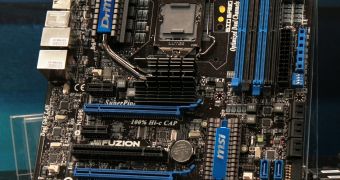Micro-Star international, like all the other competing companies attending CeBIT this year, will be doing its best to enthrall visitors will all sorts of products. One of them is the GT660 gaming notebook, which we were able to see up close even before the expo started. Another device that the company will have on display is its Big Bang Fuzion motherboard, which uses Lucid's Hydra 200 System-on-Chip (SoC) to enable true multi-GPU configurations.
The motherboard had been in development for quite a while when it was finally listed back in the first half of February. It was built with high memory capacities, advanced but reasonable, easy-to-use overclocking features and three PCI Express graphics slots. It was the Hydra 200 that made this mainboard unique, of course, as the chip can combine the power of multiple graphics cards, regardless of manufacturer or model, unlike the CrossFireX or SLI technologies, which can only pair two, or four, identical models.
Besides this multi-GPU capability, the Fuzion also comes with four DDR3-2133 memory slots, ten SATA 3.0Gbps connectors, two eSATA ports and a host of components meant to enable, enhance and facilitate overclocking. Such elements are Hi-c Caps, SFCs (Super Ferite Capacitors), DrMos (8-phase power for the central processor), Active Phase Switching and V-check points. Also, the Big Bang Fuzion comes with the OC Genie technology, which automatically overclocks the system with just the press of a button. Of course, for those end-users that want an even more direct control over their system, MSI is also offering the OC Dashboard.
The multi-GPU-supporting motherboard is based on the P55 chipset and supports Intel LGA 1156 central processing units. As it was previously mentioned, the product is already listed, carries a price tag of $369.99 and end-users that are attending CeBIT will be able to take a close look at it by visiting the company's booth.
Live report by Traian Teglet from CeBIT 2010 in Hanover, Germany.

 14 DAY TRIAL //
14 DAY TRIAL //